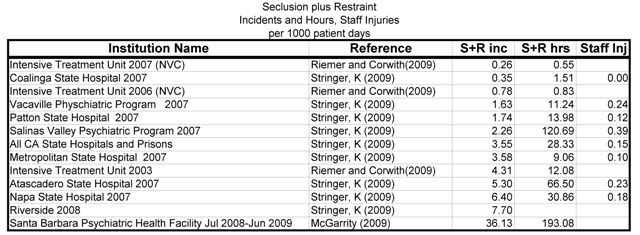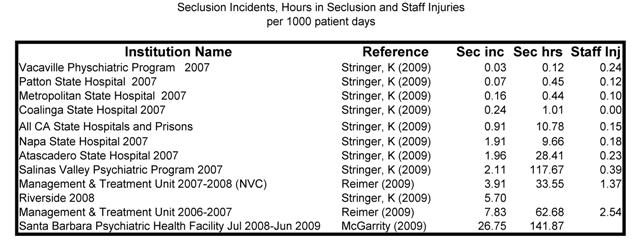Violence in Psychiatric Institutions
Contents
Intention
The intention of this page is to review measures of the use of violence in psychiatric institutions particularly those using Nonviolent Communication developed by Marshall Rosenberg.
Methodology
Published and unpublished data were collected from a variety of sources (see tables). The data collected consisted of:
- number of seclusion incidents,
- number of hours patients were secluded,
- number of restraint incidents,
- number of hours patients were restrained
- number of staff injuries over a period of time.
. The data was then "normalized" by expressing the data per 1000 patient days. When the number of patient days during the observation period was not available, the unit capacity times length of data collection period was used as an estimate of patient days.
In some cases only combined seclusion plus restraint data were available so these were compared with the calculated seclusion plus restraint data for other institutions.
A "blank" entry in a results table indicates that the data were unavailable
Results
The total seclusion plus restraint data show that only three institutions had Seclusion plus Restraint incident rate of less than 1.0 incident per 1000 patient days. These were Coalinga State Hospital and the Intensive Treatment Unit (ITU) during years that Nonviolent Communication was being used. During a previous year (2003) when the ITU was not using NVC, the violence rate was comparable (4.31) to that of other Ca State Hospitals.
The high rate (36.13) associated with the Santa Barbara Psychiatric Health Facility is most probably in large measure due to the fact that it only accepts people when they are in crisis in contrast to the CA State Hospitals which have relatively stable populations.
In Table 2,the institution using NVC , the Management and Treatment unit (MTU), does not appear to show a significant improvement over the CA State Hospitals. Its rate (3.91 incidents / 1000 patient days) is relatively high. The MTU caters for a very special population. It treats the most violent from jails, hospitals , prisons, and community and and gets the hardest cases in the state.
According to Riemer(2009) it is the most secure of four maximum security units and provides treatment "to the most acutely aggressive civil and forensic patients in need of maximum security".
References
Garrity, M. (2009) Pychiatric Health Facility Seclusion and Restraints Statistics (personal communication) 2009
Riemer,D. Corwith, C. Application of Core Strategies: Reducing Seclusion & Restraint Use, On The Edge, 13(3) (2007)
Riemer, D. Creating Sanctuary: Reducing Violence in a Maximum Security Forensic Psychiatric Hospital Unit, On The Edge - Spring 2009
Stringer,K a Using Quality Imporvement (QI) as a tool to reduce seclsion and restraints (S/R) and data sharing on the internet, presentation (2009)
Stringer K,b Excel spreadsheet incorporating CA Dept of Mental Health Data on seclusions and restraints (personal communication) 2009.
Please add any other reports of violence in psychiatric settings to this page. If you experience difficulty in adding to this page directly , please e-mail the submission to John Mudie directly.

